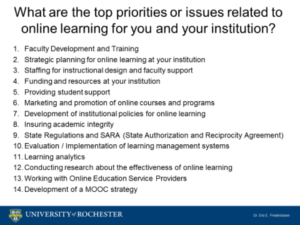Recently, I had the opportunity to attend ELI in Houston, TX. It was great to connect with many in the community and I valued the opportunity to share insights about OLC’s Suite of Quality Scorecards at the closing poster session. Having no other responsibilities at the conference (which never happens at OLC conferences, imagine that), I attended several great sessions.
I’m always interested in sessions that focus on the opportunities and challenges facing leaders of online or digital learning programs. Having served in several key administrative roles prior to joining OLC, I was interested in attending the session, A National Study of Leadership for Online Learning, presented by Dr. Eric Fredericksen, OLC Board Vice President and Associate Vice President of Online Learning and Associate Professor in Educational Leadership at the University of Rochester.
In this session, Fredericksen presented the results of a research study he conducted to better understand the role of these leaders in their institutions. This research focused on identifying the individual highest on the institutions’ organization chart with a focus on online learning. Since there isn’t a commercially available list of these individuals, he systematically reviewed the websites of 1,088 institutions using Carnegie Classifications as an organizing framework. The 30 Likert scale questions and two open-ended questions were sent to 820 institutional leaders, of which 255 responded to the web-based survey yielding a 31%response rate.
Some of the results validated what I thought he might learn, other results were really intriguing to me. For example, when respondents were asked what the highest level strategic goals for online learning were at their institution, not surprising to me, the top response was “growing total institutional enrollments above existing levels”. This was followed by “promote instructional innovation” and then “promote student engagement”. Does this ring true for you?
In general, survey respondents shared their top three priorities as: faculty development and training, strategic planning for online learning, and staffing for instructional design and faculty support. Respondents from private institutions, ranked “marketing and promotion of online courses and programs” third, whereas, respondents from public institutions ranked “funding and resources” third.
What really intrigued me was the question regarding whether or not their institution had used online learning efforts as a catalyst for organizational changes. Overwhelmingly, 72% said yes and 28% said no. While we recognize the impact of online learning on institutions, thinking about it as a catalyst for change across an institution highlights its power for transformation. I’m wondering if you have seen this at your institution as well?
Also, the study focused on the leadership role itself: how many years had the institution had the role, who did the person in this role report to, how much teaching experience did they have (in a classroom as well as online), their technology and instructional design experience, as well as whether the leader also holds a faculty appointment.
What was the most interesting to me, as I put on my hat as Chief Knowledge Officer (CKO), was how these leaders stayed connected to a larger community. I was thrilled to see OLC at the top when asked “Which of the following organizations or associations do you or your institution belong?” and “I plan on attending events or conferences from the following organizations or associations.” As CKO, I don’t take your trust in us lightly. I recognize how we need to continue to meet your institutional needs in this ever changing environment. I also appreciate that a one-size-fits-all approach doesn’t necessarily work. That’s why we pride ourselves on being your go to resource for professional development and institutional advancement of online learning, including, original research, leading-edge instruction, best-practice publications, community-driven conferences and expert guidance.
A Profile of Online Learning Leaders, as Presented by Fredericksen
Thanks Eric for uncovering these fascinating insights about leaders in our field!
 Dr. Karen Pedersen serves as the Chief Knowledge Officer for the Online Learning Consortium (OLC). In this role, she has responsibility to gather, curate and leverage the intellectual capital created by and disseminated through the organization to create and enhance services and resources provided to the OLC community. She works in five key areas including learning innovation, quality enhancement, community engagement and development, product development leadership, as well as publications, research, and policy.
Dr. Karen Pedersen serves as the Chief Knowledge Officer for the Online Learning Consortium (OLC). In this role, she has responsibility to gather, curate and leverage the intellectual capital created by and disseminated through the organization to create and enhance services and resources provided to the OLC community. She works in five key areas including learning innovation, quality enhancement, community engagement and development, product development leadership, as well as publications, research, and policy.
Prior to joining the Online Learning Consortium, Pedersen served as the Associate Vice President for Extended Campuses at Northern Arizona University.






